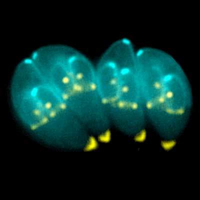 Toxoplasma gondii is a protozoan ((From H. Michael Kubisch. Photograph shows toxoplasma dividing into daughter cells. Image provided by Ke Hu and John Murray. DOI: 10.1371/journal.ppat.0020020.g001)) that can infect birds and mammals — although it can reproduce sexually only in domestic and wild cats. It has been estimated that about one in three human adults is infected, although the symptoms are usually minor. However, one particularly troublesome aspect of toxoplasma is its ability to cross the placenta from the mother and infect the growing fetus in utero. This can result in serious consequences in newborn children sometimes leading to heart and eye problems.
Toxoplasma gondii is a protozoan ((From H. Michael Kubisch. Photograph shows toxoplasma dividing into daughter cells. Image provided by Ke Hu and John Murray. DOI: 10.1371/journal.ppat.0020020.g001)) that can infect birds and mammals — although it can reproduce sexually only in domestic and wild cats. It has been estimated that about one in three human adults is infected, although the symptoms are usually minor. However, one particularly troublesome aspect of toxoplasma is its ability to cross the placenta from the mother and infect the growing fetus in utero. This can result in serious consequences in newborn children sometimes leading to heart and eye problems.
A recent study in the US has put an interesting spin on the genetic composition of toxoplasma. Toxoplasma DNA obtained from various chicken populations around the globe points to the existence of four major genetic strains, two found only in South America, one in the rest of the world — but not in South America — and a fourth population that seems to be ubiquitous.
The authors speculate that toxoplasma evolved initially in South America and then spread into Eurasia. The two populations were then separate for a long time. How this early migration might have happened is unclear; perhaps the parasite was carried by a bird. However, the spread of the Eurasian population back into North America, as well as the spread of the fourth population around the globe, could have had only one facilitator: us. At first the slave trade with its crammed and unsanitary ships possibly spread the parasite. Later, cargo ships containing agricultural goods might have given toxoplasma a lift to distant shores: in some locations the proportion of recent toxoplasma arrivals appears higher around port cities than further inland.
Yet another example of how human activity can shape evolutionary events, and contribute to diversity, in other species.